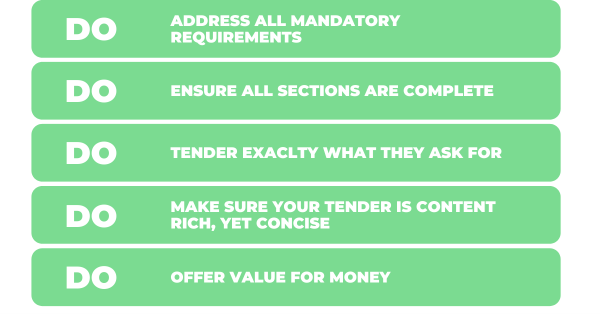The Dos and Don’ts of Government Tendering
December 23, 2022
Government contracts are a valuable source of income for small and medium-sized businesses. Since the 1st of July 2022, Federal departments and agencies must source one fifth of their annual procurement from small and medium businesses.
The Government tendering process is highly competitive, and businesses need to put together detailed applications to prove why they are the best business for the job. Applying for tenders is often not an easy task, so Business Foundations has compiled a list of dos and don’ts in the tendering process.
Do: Address all mandatory requirements.
Each tender will outline their list of requirements and whether certain specifications are mandatory or desirable. To not have your application disqualified, you must address every single mandatory requirement, and include as many desirable requirements as you can. Examples of mandatory requirements can include:
- A valid ABN,
- Business Profile and Business Overview,
- References from former clients,
- Pricing, and whether it is fixed or variable,
- Delivery details and charges,
- A schedule starting meetings, progression, and delivery dates,
- Whether you will be delivering on a recurring or one-off basis,
- GST and other taxes,
- Relevant insurance policies.
It is also important to review the terms and conditions of the tender to identify if there is anything that can disqualify you from the tender. It is best to identify whether you are suitable before progressing too far in the application process.
Do: Ensure all sections are complete.
A commonly cited reason for rejected tenders is that not all sections were complete. Often, a tender application is broken up into sections which are given to different assessors to review. Therefore, if you answer questions by saying “please see above” or “refer to response for question 3”, they will not be able to look back and check this for you. If you feel that you cannot answer a question, perhaps due to a lack of experience, state why you cannot answer the question, rather than just leaving it blank.
In addition, make sure that you have reviewed the document and put your signature in every place it is requested. Often, signatures in the middle of the document are forgotten about, which can immediately disqualify an application.
Do: Tender for what they ask for, not what you think they should have asked for.
Even if you think there is a better way to do it, make sure that you are tendering for exactly what the Government has asked for. It is important that you analyse the selection criteria and are addressing all elements of the question with absolute clarity. You should also be proving your ability to fulfil the requirements of the project by offering examples and lots of detail.
If you answer the tender in terms of how you think the project should be run instead, you risk being disqualified. You can, however, ask for clarification on the requirements of the tender, or submit a compliant tender that includes some details of what you think they should have asked for.
Do: Make sure your tender is content rich, yet concise.
Often, there are a large volume of lengthy tender applications, so try your best to make it as simple to read as possible. Write in plain language and avoid jargon or overused terms such as ‘synergy’ and ‘dynamic’. To make your application easier to read, avoid vague or repetitious sentences, and instead ensure it is detail-rich and straight to the point. If possible, get another person to proofread your application to make sure it is completely free of mistakes before submitting.
It is also important to ensure that you are putting sufficient detail into your responses. It is not enough to assume that the person reading your application knows about your business, especially if you are an incumbent supplier, so you must provide clear details and examples in your responses. Where possible, you should quantify your statements. Instead of saying you will save the Government money, prove it with real examples and figures.
Do: Offer value for money.
Whether you are applying for a government tender or are going through the procurement process, offering value for money is a key consideration in the tendering process. The Government must be able to recognize that your business is offering value for money, you cannot overcharge for the sake of it. All pricing must be within the set budget of the tender, if you believe your costs would exceed that number, then the tender is not the right fit for your business. In addition, you should not assume that you will get a second chance to negotiate on pricing, instead, submit your best offer the first time around.
Ultimately, you should not sell yourself short, but also be mindful that the best value for money will be a consideration when selecting a successful application.

Don’t: Change the assigned format.
Most tenders have a specific guideline on how you need to format your application. Whilst you may think that choosing a more eye-catching design may give you an advantage, tender applications are often rejected for not following the formatting guidelines. Therefore, you must carefully read and abide by their formatting style, which may include the use of templates, fonts, font colours, font sizes, and line spacing.
Don’t: Submit your application late.
If you submit your tender past the closing date and time, it will not be considered. It is essential to know exactly when the deadline for the tender is. This means factoring in time zones, as Western Australian businesses can be caught out by AEST or AEDST. Aim to have your tender ready to submit well before the deadline and have all the relevant documents prepared and ready to go, otherwise you risk all your hard work being wasted.
Don’t: Collude with other businesses.
This is less common in the SME sector, but sometimes businesses will team up with other businesses to try and improve their chances of winning a tender. This may include multiple businesses submitting the same tender whilst agreeing to share the work if one of them wins, or one business applying for a tender whilst covertly sharing the work with others if they win. If you are found to have colluded, your application will be immediately disqualified, and you will have likely ruined your chances of securing any government tenders in the future.


Government tendering can be a very valuable source of income for small and medium business owners. However, tender applications are a lengthy document and can take a lot of time to prepare, so it is important that you don’t overlook simple mistakes that can have your tender disqualified.
Business Foundations can help you with your tendering process and ensuring you submit a competitive application. Find out more here.
Acknowledgement Of Country
Business Foundations acknowledges the traditional custodians throughout Western Australia and their continuing connection to the land, waters and community. We pay our respects to all members of the Aboriginal communities and their cultures; and to Elders both past and present.
Victoria
The Commons
80 Market Street,
South Melbourne VIC 3205
admin@businessfoundations.com.au
Western Australia
Wesley Central
2 Cantonment Street,
Fremantle WA 6160
admin@businessfoundations.com.au


Get In Touch
Have a question or to find out how we can help you, please get in touch.






